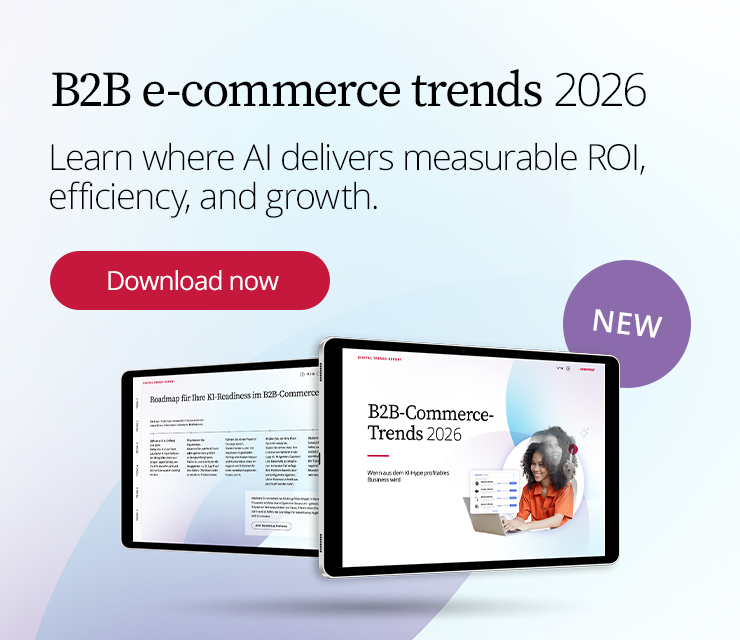Artificial intelligence (AI) is rapidly reshaping digital commerce. What once seemed like a futuristic vision is now a reality: Autonomous agents and AI-powered copilots are taking over increasingly complex tasks in e-commerce – from product data enrichment to intelligent purchasing assistance. According to recent studies, 71% of companies worldwide already use AI technologies, primarily to boost revenue, reduce costs, and address talent shortages.
AI presents immense opportunities, especially in B2B commerce, where complex processes, extensive product catalogs, and unique customer requirements create significant challenges. While many companies are still experimenting, Intershop is already putting AI into action. With copilots, autonomous agents, and AI-driven personalization platforms, the company is shaping the future of intelligent commerce – where AI systems collaborate seamlessly with human expertise to optimize business processes.
What does this mean for companies? What role will AI agents and copilots play in the future of B2B commerce? And how will e-commerce teams adapt? To answer these questions, we spoke with Tobias Giese, Executive VP Customer Lifecycle, and Nils Breitmann, Senior Director Artificial Intelligence at Intershop.
AI in B2B commerce: Where are we today?
Copilots and autonomous agents: From vision to reality
AI-driven automation for B2B commerce
Outlook: Intershop’s AI vision – and why businesses must act now

AI in B2B commerce: Where are we today?
AI is becoming increasingly important in B2B commerce – but are companies truly ready for the next step? Where do they currently stand?
Tobias: In recent years, we’ve seen a significant shift. While AI was once primarily an experimental technology, companies now implement it strategically to improve core business processes. In B2B commerce, it’s no longer just about gaining initial experience with AI but about making tangible improvements in efficiency, automation, and decision-making.
Companies are at different levels of AI maturity. Some are still in the early stages, using AI selectively for personalization or process automation. Others have embedded AI into their strategic planning, leveraging data-driven insights to optimize their business. What’s clear is that AI adoption is becoming more professionalized – it’s no longer about experimentation but real-world implementation with measurable impact.
How does the talent shortage affect AI adoption?
Nils: The shortage of skilled workers is accelerating AI adoption dramatically. Companies that were once hesitant now see AI as a necessity. In fields such as IT, sales, and data management, demand for skilled professionals far exceeds supply. AI serves as a powerful tool to alleviate these challenges, enabling teams to work more efficiently and produce higher-quality results. For example, a product content agent doesn’t just create more product descriptions in less time – it generates content that is more relevant, precise, and optimized for search and conversion.
AI is also changing the way we work. The e-commerce manager of the future will act more as a strategic orchestrator of intelligent systems. With AI tools handling complex workflows, fewer experts will be able to manage larger operations – a major advantage in times of limited human resources. AI is no longer just an experiment; it’s a competitive advantage.
What are the biggest challenges in AI adoption – and how can they be overcome?
Nils: The biggest hurdle in adopting AI is often simply not getting started. Many companies wait for the “perfect moment” – whether due to concerns about insufficient data quality, unclear use cases, or a lack of resources. But hesitation means falling behind. The key is to adopt an “AI-first” mindset: How would you solve a problem if AI were already fully integrated? Companies that make this mindset shift benefit faster from improved processes and scalable efficiency.
Equally important is a clear organizational commitment to AI. Successful companies establish dedicated AI leads – whether it’s a small team or an individual – who work closely with AI ambassadors across departments. This internal collaboration ensures that AI is implemented in a way that creates real business value.
The best approach is to start pragmatically. Companies that begin with concrete, scalable use cases – such as automation or optimized decision-making – not only boost efficiency but also lay the foundation for a data-driven, future-proof strategy.

Copilots and autonomous agents: From vision to reality
AI agents and copilots are the next big thing. How are they transforming B2B commerce, and what sets them apart?
Tobias: AI agents and copilots introduce an entirely new level of efficiency and intelligence to B2B commerce. Copilots are designed to support people in their daily work – they help users quickly access relevant information, optimize product descriptions, and handle customer inquiries more efficiently. Essentially, they act as personal assistants that provide knowledge and streamline workflows.
Agents, on the other hand, take it a step further. They operate autonomously, taking over entire processes without requiring constant human supervision. For example, an agent can independently analyze, optimize, and integrate product data from various sources into the system. It can also dynamically adjust pricing based on order histories, inventory levels, or market fluctuations. As a result, companies not only save time but also improve the quality of their data and decision-making.
Nils: The key difference between copilots and agents lies in their level of autonomy. Copilots always operate in a 1:1 relationship with a user – they provide targeted support, answer questions, offer recommendations, and enhance productivity. Agents, on the other hand, function independently on behalf of the company and can be orchestrated in a 1:N relationship, meaning that a single user manages multiple agents simultaneously – like a team leader coordinating various employees. While a copilot helps a sales representative quickly generate an appropriate offer, an agent can autonomously enrich product information for all customers with structured attributes and descriptions.
Ultimately, both technologies complement each other perfectly: Copilots enhance human-AI interaction, while agents handle operational tasks in the background. Together, they create a new level of efficiency in B2B commerce.
Will the increasing use of copilots and agents turn the vision of autonomous commerce into reality?
Tobias: Autonomous commerce has long been a vision – but with today’s copilots and AI agents, we are getting significantly closer to making it a reality. Companies are no longer just automating individual processes; they are increasingly enabling entire business operations to run autonomously.
That doesn’t mean human expertise becomes obsolete. Rather, the role of e-commerce teams is fundamentally shifting: they are orchestrating intelligent systems, driving strategic decisions, and focusing on innovation while AI agents take over operational tasks. This shift is particularly evident in B2B commerce, where processes are complex and data-intensive.
Nils: Exactly – we have laid the technological foundation to bring autonomous commerce to life. The introduction of agents and copilots marks the transition from assisted automation to truly autonomous processes. Companies can now optimize product data without manual intervention, calculate dynamic pricing, and deliver personalized product recommendations – in real time, powered by intelligent algorithms.
However, autonomous commerce is not a final destination but an ongoing transformation. AI can automate and optimize processes, but it is still up to humans to set the course – with creative ideas, new business models, and a strategic vision. The future doesn’t belong to those who simply adopt technology, but to those who guide it with foresight and responsibility – and that is where the true competitive advantage lies.

How do AI agents and copilots fit into a modern e-commerce architecture, and what structures are required?
Nils: AI agents and copilots can only unlock their full potential when embedded in a powerful and flexible architecture. That’s why, at Intershop, we rely on a three-layer architecture consisting of composable commerce components, a data fabric, and AI agents.
The composable commerce components form the foundation. They encompass all core functions of a modern commerce platform – from product search and order management to personalization. Since these components are modular, businesses can expand their systems step by step and adapt to evolving market and customer demands.
The data fabric acts as the central data layer of the architecture. It connects and orchestrates data from various systems – such as commerce, ERP, CRM, or PIM – and provides it in a consolidated, contextualized format. This ensures that AI agents have seamless access to high-quality data, which they can leverage for analysis and automation.
The AI agent layer builds on these two levels. Here, AI agents and copilots operate autonomously to optimize and automate processes. Since they connect to both the data fabric and commerce functions via APIs, they integrate seamlessly into existing systems and can be further developed as needed.
This architecture enables companies to deploy AI agents strategically without having to completely rebuild their platform. It combines scalability with high adaptability – a key advantage in a rapidly evolving market environment.


AI-driven automation for B2B commerce
Sam Altman has predicted that autonomous AI agents will enter the workforce by 2025. What AI-powered assistants and intelligent helpers does Intershop offer?
Tobias: As part of our AI-first strategy, we empower businesses with specialized AI agents and copilots that automate key e-commerce tasks. These intelligent solutions help businesses streamline processes and make more effective, data-driven strategic decisions.
One example is the Intershop Copilot for Buyers, which enhances the buying experience through intelligent product search, automated recommendations, and interactive purchasing workflows. It helps web store visitors find the right products faster and simplifies the ordering process.
Another key solution is the Intershop Product Content Agent, which automates the enrichment and optimization of product data by analyzing and refining information from multiple sources. This is particularly crucial in B2B commerce, where accurate, high-quality product data is essential for driving sales and delivering personalized recommendations.
And this is just the beginning – we are continuously developing additional AI agents to support businesses in automating and optimizing their digital commerce operations.
What functionalities does the Intershop Copilot for Buyers offer, and how does it enhance the customer journey in B2B commerce?
Tobias: The Intershop Copilot for Buyers is an AI-powered procurement and service assistant designed specifically for the demands of B2B commerce. Built on Microsoft technology, it optimizes product search, the purchasing process, and customer service by integrating conversational AI, personalized product recommendations, and intelligent self-service functions.
One of its standout features is Conversational Product Discovery, allowing customers to find products through solution-oriented queries, similar to speaking directly with a sales expert. The Copilot leverages SPARQUE.AI to generate highly relevant product recommendations, significantly increasing conversion rates.
Another key advantage is the streamlined ordering and reordering process. Customers can reorder products with just a few clicks or add items directly from previous transactions to their shopping cart, reducing the time spent on repetitive procurement tasks.
Customer service also benefits: the Copilot centralizes knowledge and provides step-by-step instructions for maintenance and repairs, minimizing downtime. With image- and voice-powered interactions, customers can identify products using a photo or voice command and instantly receive the relevant information or purchasing options.
Overall, the Intershop Copilot for Buyers enhances the customer journey by boosting efficiency, creating a more intuitive shopping experience, and delivering personalized interactions – 24/7.
Product data quality is a well-known challenge for B2B organizations. How does Intershop’s Product Content Agent help?
Nils: High-quality product data is critical for success in digital commerce, yet wholesalers, in particular, struggle to manage vast product catalogs with data from multiple, often inconsistent sources. The Intershop Product Content Agent addresses this challenge head-on, leveraging AI to automate the optimization, validation, and enrichment of product information.
Using generative AI and Retrieval-Augmented Generation (RAG), the agent aggregates data from manufacturer PDFs, supplier databases, and other sources. It identifies and fills missing or inaccurate information, ensuring that businesses receive structured, consistent, and search-optimized product data. One of its key features is automated keyword extraction, which improves searchability and product discovery.
The first real-world applications confirm its effectiveness: a leading wholesaler saw significant improvements in search performance and customer experience after implementing the Product Content Agent. Along with higher data quality, the company benefited from more efficient content management and a substantial reduction in manual workload, leading to operational cost savings and optimized online shop performance.
For wholesalers managing large, complex assortments, this represents a clear competitive advantage.
Which copilots and agents is Intershop planning next?
Tobias: Our goal is to further expand our AI-powered commerce platform and provide businesses with even more powerful AI-driven assistants. The next major step is the Intershop Copilot for Sellers, which will act as a central orchestrator for various autonomous AI agents. It enables e-commerce and sales teams to manage processes, retrieve insights, and receive intelligent recommendations through natural language commands. For example, sellers can quickly identify high-demand products, cross-selling and upselling opportunities, or areas where pricing can be optimized.
Additionally, we are working on specialized AI agents, including a Translation Agent and a Pricing Agent. The Translation Agent automates the creation of multilingual product descriptions, ensuring that they are contextually accurate, consistent, and tailored to specific markets – a major advantage for globally operating B2B merchants. The Pricing Agent, on the other hand, analyzes market trends, order histories, and competitor pricing to enable dynamic pricing strategies. It helps businesses adjust prices flexibly while maximizing profit margins.
These new agents and copilots are the next step toward an even smarter and more efficient AI-powered commerce environment, where humans and machines work together seamlessly.

Outlook: Intershop’s AI vision – and why businesses must act now
Where will Intershop be in 3–5 years with AI? Is Intershop becoming an “AI-first” company?
Tobias: AI is already a central part of our strategy – and it will become even more important in the coming years. We are taking a holistic AI approach that includes both external AI-driven products and internal process optimizations.
On the one hand, we are developing AI-powered solutions for our customers, including intelligent agents and copilots that enhance commerce processes. These solutions help B2B organizations make data-driven decisions, increase conversion rates, and automate their operations at scale.
At the same time, we are leveraging AI internally to streamline our own processes – across sales, marketing, customer support, product development, finance, and more. AI agents handle repetitive tasks, improve data quality, and enable more efficient workflows.
Our goal is to establish Intershop as a leading provider of AI-powered B2B commerce in the coming years – while also making our internal processes even more agile and efficient through AI-driven automation.
What is the key message for companies that are still hesitant to invest in AI?
Nils: Companies that don’t act now risk falling behind. AI is no longer a future technology – it is already a key competitive advantage. Businesses that embrace AI-powered personalization, automation, and intelligent process management early will benefit from greater efficiency, improved customer interactions, and more sustainable business models.
The most important first step is to start pragmatically. Instead of making large-scale investments upfront, companies should begin with specific, scalable use cases. For example, implementing an AI copilot to optimize customer service or using a Product Content Agent to automate product data enrichment. Small, measurable successes help build internal buy-in and pave the way for further AI-driven innovations.
The technology is here – now it’s about using it strategically. Businesses that integrate AI into their commerce platforms today won’t just be more efficient in the years ahead – they will be more innovative and more competitive.

Key takeaways
-
AI is transforming B2B commerce: Copilots and autonomous agents are increasingly taking over key tasks in digital commerce – from product discovery to process automation.
-
Autonomous commerce is becoming a reality: With the latest generation of AI agents, the vision of largely autonomous commerce is within reach. Companies are orchestrating AI systems rather than managing manual processes.
-
Intershop relies on a three-tier AI architecture: Composable commerce components, a powerful data fabric, and AI agents ensure seamless integration, intelligent automation, and data-driven decision-making.
-
Intershop's AI-powered commerce platform is growing: In addition to the Intershop Copilot and Product Content Agent, Intershop is developing new AI agents like a Copilot for sellers, a Pricing Agent, and a Translation Agent.
-
AI is a competitive advantage – action is needed now: Companies that adopt AI early improve efficiency, optimize processes, and enhance the customer experience. The best entry point is a scalable use case with immediate value.
-
Intershop is transforming into an “AI-first” company: Through both AI-powered solutions for customers and internal AI-driven optimizations, Intershop is driving the future of digital commerce.
Schedule an online demo now and experience Intershop's AI solutions in action!








